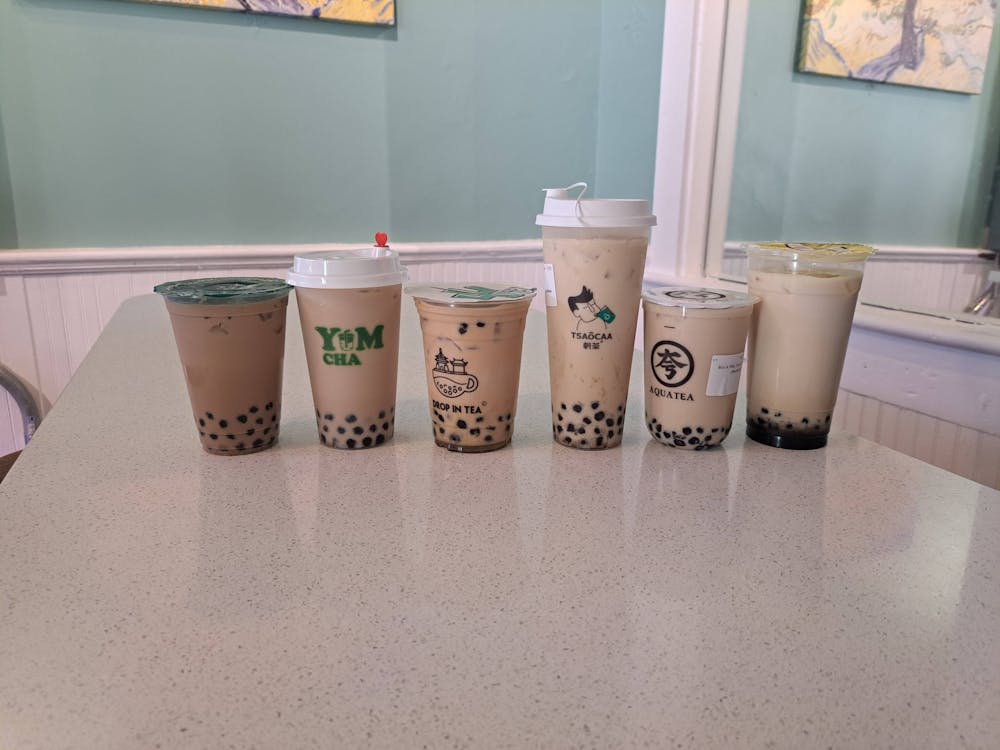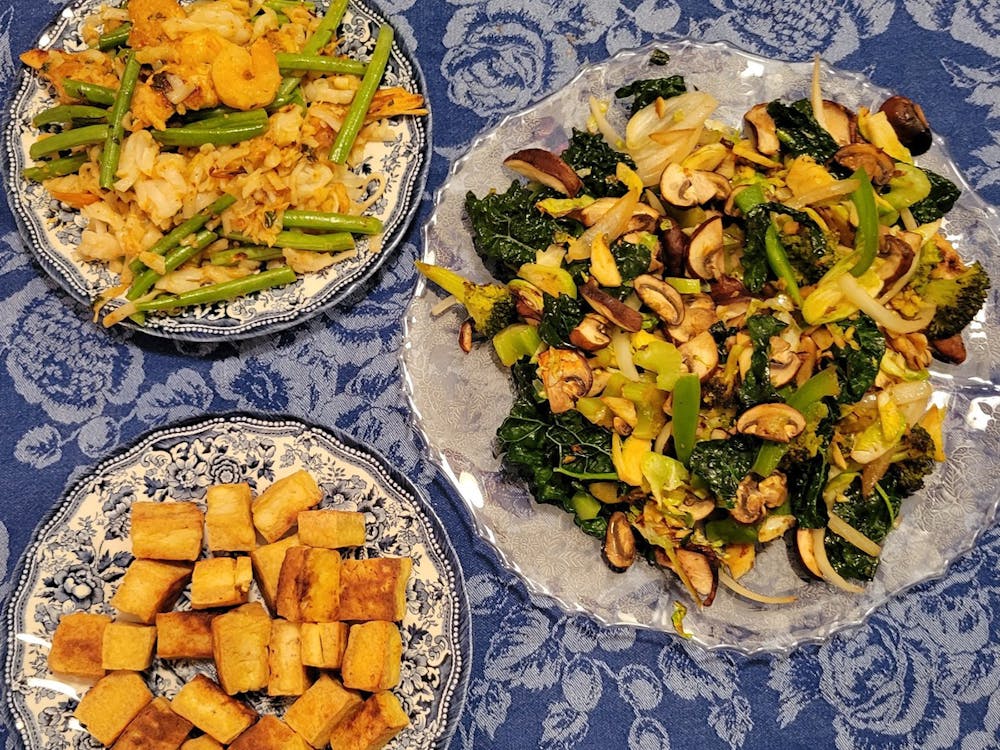"FREEZE UNTIL THE BLACKOUT!"
"My fan broke!"
"No talking backstage, I can hear you from out here!"
"Pick up your hanboks, please!"
"I NEED TO QUICK-CHANGE FOR THE NEXT DANCE, MOVE!"
***
It's February 12th, and Fusion is less than one week away. Dress rehearsal at Hall Auditorium is in progress: the first few rows of seats are strewn with backpacks and bamboo hats, fans and flannels, kimonos and coffee that has been sitting there since 8:45 am. On stage, the show begins with the percussive sounds of Stepping, immediately followed by the dramatic flowing of lyrical dance. Dancers peek out of the curtains and watch the emcees read through their lines. Fans snap open and flare to the heavy drum of Korean traditional music, which is quickly traded out for Natalie La Rose's "Somebody." Traditional Filipino tinikling music fades out so *NSYNC's "Bye Bye Bye" can fade in, with the steady wooden clack of the bamboo poles connecting the two. Fusion Co-Chairs senior Harry Reu and junior Anna Johnson alternate from observing in the audience seats to walking across the stage, giving feedback to the dancers and crew members. Behind the curtains, choreographers glance over the lineup for their cue to enter. Nervous dancers silently run through dance moves they've practiced since October as if they could've been forgotten overnight.
But it's not all so serious. One of the emcees forgets his line and fumbles over the improv he attempts afterwards. The entire Stepping performance stops because the dancers are all laughing too hard to continue. Dancers are attempting to converse with each other across the stage through made up sign language. Raucous laughter and applause rip through the air when one of the emcees is slapped across the face according to script. The red handprint on his face is still visible during the final dance.
And then they run the entire show again, with full lights and music adjustments, dance corrections fresh in the performers' minds. It's not all so serious, but there is a certain pressure building within the walls of the auditorium. Fusion is in one week, and it needs to be perfect because it's important.
But why?
***
[Scene 12]
Enjoy what you're reading?
Signup for our newsletter
Kyle: You know I'm all about that pho.
Warwick: I'm always down to pho, let's go. **Exit R side with one mic**
***
Posters and pamphlets are stuck to bulletin boards and distributed across tables in the Armstrong Student Center, calling Fusion "the ultimate cultural dance experience."
Chinese, Chinese American, Korean American, Indian American, Vietnamese, mixed, African American, Caucasian.
The dancers are various in background, but the goal of Fusion is the same: to unite people and to spread awareness for racial and ethnic diversity on Miami's campus.
"It's to raise cultural awareness for the campus, not just for our targeted audience. We want it to be so that a lot of different students, not just our members, go to this dance show to see what AAA is about and the different cultures we represent in the club," says Buo Charoenwong, junior and vice president of Asian American Association (AAA).
Fusion is AAA's main annual production, and an incredible amount of time and effort is put into it by everyone. Dance practices start during fall semester, and frantically increase in time commitment as the clock ticks down to showtime. Practice rooms are shared -- thumping bass of hip hop on one end, koto music of Japanese traditional on the other and the occasional burst of bubbly Korean pop in the middle. Students squeeze dance practices in between time for homework, jobs and extracurriculars. Many have dark circles hanging under their eyes from hours of sleep sacrificed just to learn a difficult section of choreography.
Yet, in this year's production, there are over 70 people involved. When looking around backstage, it's not hard to understand why.
"Fusion is a way to get representation, but I mostly think about it internally, just getting to know other Asian Americans," senior Hannah Pfeifer, a dancer and choreographer, says. "It's fun to be around people who face the same struggles as you."
And for many, this one performance will have a lifelong impact.
"Fusion has both internal and external benefits,"Harry Reu says as the crew adjusts for the next performance. "It's both educational on the outside and, on the inside, it creates these social bonds that--as cheesy as it sounds--last a lifetime."
***
[Scene 10]
Jerk: I said 'KONICHIWA.' Wait, 'NEE HOW!' Hahaha... **walks away**
Kyle: **yelling** Hey, that's not funny!
Daisy: Let's go, it's not worth it.
Kyle: I seriously hate that. I know it's not the same since you guys are actually from Asia, but it offends me just as much being half Filipino, half German.
Johnny: I just don't get why people automatically make assumptions about us. Like I'm from Taiwan and Daisy's from Hong Kong, but we both speak English perfectly fine.
Erika: I'm from Dayton and people still yell 'konichiwa' at me sometimes.
Kyle: Sometimes the disrespect for Asians and Asian Americans on this campus goes too far.
***
Printed across hundreds of tickets are the words, True Life: I Am an Asian Student at Miami. For many of the students taking part in the production, this theme hit close to home. In previous years, the majority of the plotlines have been based off of TV shows or movies, like "How I Met Your Mother in Asia," "Mr. and Mrs. Wong" and "Running Man," a popular Korean game show.
This year, the Fusion Chairs were determined to make it different.
In between the jokes about college life and the goofing around going on backstage, a certain tenseness settles over everyone when the emcees begin reading their lines about the letter an anonymous professor published last year -- the letter calling international students, specifically Chinese students, "dead weight" for having lower English skills. This is not the first time the Asian and Asian American students crowding on and around the stage have faced such discrimination and racism. The same grim atmosphere drops heavily over everyone when the character of the drunk student shouts racist greetings. The emcees do not have to fake hurt or angry emotions -- many have experienced this before.
Many have experienced worse.
"No, where are you really from?"
"Open your eyes! Why can't I see your eyes?"
"Chink!"
What makes this year's theme especially relevant? Reu's answer is simple.
"We finally get to voice our ideas, our perspectives and our views," he said. "We get to finally say things that have happened to us on this campus. Some of the issues with racism and discrimination we've dealt with come from real life examples that happen to minorities here all the time, so we finally get to shed light on some of those things."
President of AAA senior Alan Hu agreed.
"All of the Asian Americans are aware of these problems--obviously, because we're facing them--and I feel like the majority of the community actually doesn't understand," he said. "The goal of this year's Fusion, though it may be a bit darker of a mood, is to get our message out to a wider audience that we wouldn't be able to reach through other mediums."
As dress rehearsal comes to a close, everyone trudging tiredly out of the auditorium, Fusion 2016 becomes one day closer -- the pressure to perform well just a little higher, and the need to finally be heard growing heavier.
***
February 19th. 7:30 p.m. Hall Auditorium.
Stepping. Lyrical. Filipino. Hip hop. Korean. Korean pop. Chinese. Popping. Indian. Japanese. Co-ed couple. Vietnamese. Senior hip hop.
After the seniors finish their performance and pull all of the other dancers out on stage, and after the audience applauds and the curtain comes down.
Reverberating within the walls of the auditorium, traveling with each person who spreads word about the show -- their voices words are out there. A great relief passes over the dancers huddled together in a celebratory circle behind the curtain.
There's a lot of hugging. Some people are singing loudly to Dawin's "Dessert" thumping through the speakers. Others are updating their Snapchat stories with wide grins and selfies. Seniors are crying.
"I think this year was definitely my favorite so far," Buo says.
Fusion is done. It's finally over.
And their voices are finally heard.




